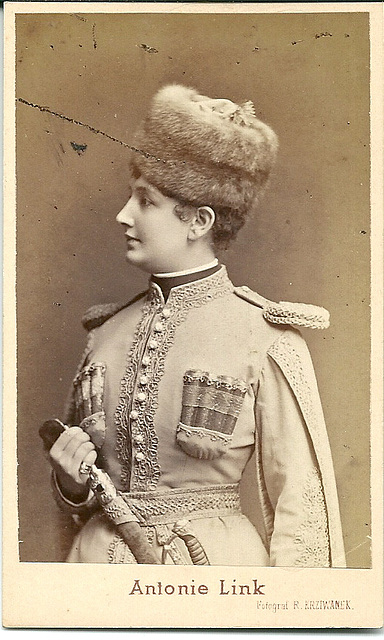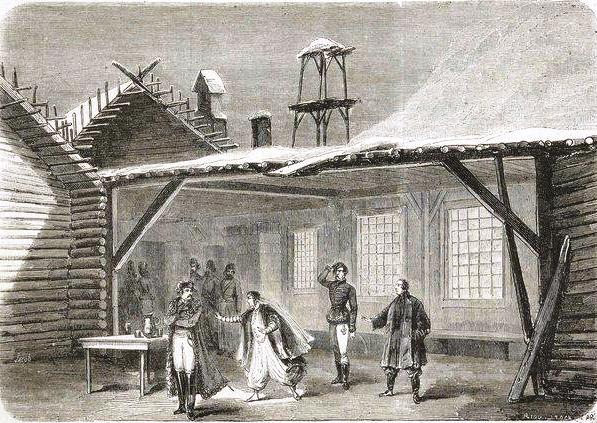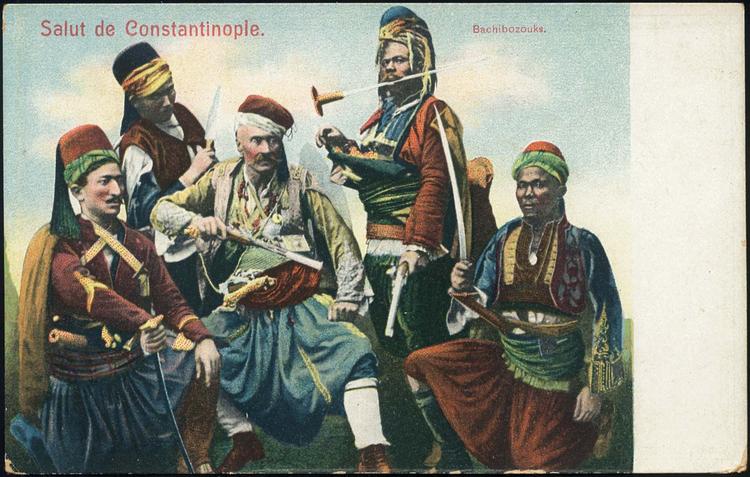|
Fatinitza
''Fatinitza'' was the first full-length, three-act operetta by Franz von Suppé. The libretto by F. Zell (a pseudonym for Camillo Walzel) and Richard Genée was based on the libretto to ''La circassienne'' by Eugène Scribe (which had been set to music by Daniel Auber in 1861), but with the lead role of Wladimir, a young Russian lieutenant who has to disguise himself as a woman, changed to a Travesti (theatre)#Women in male roles, trousers role; in other words, a woman played the part of the man who pretended to be a woman. It premièred on 5 January 1876, at the Carltheater Vienna, and proved a huge success, running for more than a hundred performances, with the march "Vorwärts mit frischem Muth", proving a particular hit. The operetta as a whole is no longer in the popular repertory, but the overture is performed as a stand-alone piece. Background Viennese operetta sprang out of an attempt by Viennese composers to imitate Jacques Offenbach's works, after the highly successful ... [...More Info...] [...Related Items...] OR: [Wikipedia] [Google] [Baidu] |
Franz Von Suppé
Franz von Suppé (né Francesco Ezechiele Ermenegildo de Suppe) (18 April 181921 May 1895) was an Austrian composer of light operas and other theatre music. He came from the Kingdom of Dalmatia, Austro-Hungarian Empire (now part of Croatia). A composer and conductor of the Romantic period, he is notable for his four dozen operettas. Life and education Franz von Suppé's parents named him Francesco Ezechiele Ermenegildo when he was born on 18 April 1819 in Spalato, now Split, Dalmatia, Austrian Empire. His father was a civil servant in the service of the Austrian Empire, as was his father before him; Suppé's mother was Viennese by birth. He simplified and Germanized his name when in Vienna, and changed "de" to "von". Outside Germanic circles, his name may appear on programmes as Francesco Suppé-Demelli. He spent his childhood in Zara, now Zadar, where he had his first music lessons and began to compose at an early age. As a boy he had encouragement in music from a local ban ... [...More Info...] [...Related Items...] OR: [Wikipedia] [Google] [Baidu] |
Operetta
Operetta is a form of theatre and a genre of light opera. It includes spoken dialogue, songs, and dances. It is lighter than opera in terms of its music, orchestral size, length of the work, and at face value, subject matter. Apart from its shorter length, the operetta is usually of a light and amusing character. It sometimes also includes satirical commentaries. "Operetta" is the Italian diminutive of "opera" and was used originally to describe a shorter, perhaps less ambitious work than an opera. Operetta provides an alternative to operatic performances in an accessible form targeting a different audience. Operetta became a recognizable form in the mid-19th century in France, and its popularity led to the development of many national styles of operetta. Distinctive styles emerged across countries including Austria-Hungary, Germany, England, Spain, the Philippines, Mexico, Cuba, and the United States. Through the transfer of operetta among different countries, cultural cosmop ... [...More Info...] [...Related Items...] OR: [Wikipedia] [Google] [Baidu] |
Richard Genée
Franz Friedrich Richard Genée (7 February 1823 – 15 June 1895) was a Prussian born Austrian libretto, librettist, playwright, and composer. Life Genée was born in Gdańsk, Danzig. He died at Baden bei Wien. Works He is most famous for the libretto of ''Die Fledermaus'', Johann Strauss II's most famous operetta. He co-wrote the libretto without having met top-billed librettist Karl Haffner, who constructed the new story based on a play by Henri Meilhac and Ludovic Halévy, which was considered too shocking to perform outside Paris. Genée, however, wrote the operetta's actual text and drew nothing from Haffner beyond the names of the characters.Andrew Lamb (writer), Andrew Lamb. Liner Notes, ''Die Fledermaus'', EMI/Angel Records, 1986 One of his best-known works was the libretto of Karl Millöcker's operetta ''Der Bettelstudent'', which he co-wrote with Friedrich Zell (the pseudonym of Camillo Walzel). He also wrote the libretto to Ella Adayevskaya's 1877 opera ''Zarya (op ... [...More Info...] [...Related Items...] OR: [Wikipedia] [Google] [Baidu] |
La Circassienne
''La circassienne'' (The Circassian Woman) is an opera (''opéra comique'') in three acts composed by Daniel Auber to a French-language libretto by Eugène Scribe based on Louvet de Couvrai's 1787 novel ''Une année de la vie du chevalier de Faublas''. It was premiered on 2 February 1861 by the Opéra-Comique at the second Salle Favart in Paris. Set in Russia during the Russian-Circassian War, the opera was also known under the titles ''Morte d'amour'' (Died of Love), ''La révolte au Sérail'' (The Revolt in the Seraglio), ''Alexis'', and ''Faublas''. Background and performance history ''La circassienne'' was one of Auber's last operas, composed when he was nearly 80 years old. His librettist, Eugène Scribe, had been Auber's regular collaborator since 1823 and had written the libretto for his greatest success, ''Fra Diavolo''. The opera was premiered by the Opéra-Comique in Paris on 2 February 1861 in a production directed by Ernest Mocker. In his review of the premiere for ... [...More Info...] [...Related Items...] OR: [Wikipedia] [Google] [Baidu] |
Carltheater
The Carltheater was a theatre in Vienna. It was in the suburbs in Leopoldstadt at Praterstraße 31 (at that time called Jägerzeile). It was the successor to the Leopoldstädter Theater. After a series of financial difficulties, that theater had been sold in 1838 to the director, Carl Carl, who continued to run it in parallel to his Theater an der Wien until 1845. Two years later, the building was partially demolished and rebuilt following the plans of architects August Sicard von Sicardsburg and Eduard van der Nüll, who would later design the Vienna State Opera. The theatre was opened under the name ''Carltheater'' in the same year, 1847. Many pieces by Johann Nepomuk Nestroy premiered here; between 1854 and 1860, Nestroy was the director of the theatre. In subsequent years, many well-known Viennese playwrights wrote pieces for the Carltheater and reinforced its reputation as the favoured opera house for Viennese folk-pieces and operettas. After a rapid changeover of directors ... [...More Info...] [...Related Items...] OR: [Wikipedia] [Google] [Baidu] |
Operetta
Operetta is a form of theatre and a genre of light opera. It includes spoken dialogue, songs, and dances. It is lighter than opera in terms of its music, orchestral size, length of the work, and at face value, subject matter. Apart from its shorter length, the operetta is usually of a light and amusing character. It sometimes also includes satirical commentaries. "Operetta" is the Italian diminutive of "opera" and was used originally to describe a shorter, perhaps less ambitious work than an opera. Operetta provides an alternative to operatic performances in an accessible form targeting a different audience. Operetta became a recognizable form in the mid-19th century in France, and its popularity led to the development of many national styles of operetta. Distinctive styles emerged across countries including Austria-Hungary, Germany, England, Spain, the Philippines, Mexico, Cuba, and the United States. Through the transfer of operetta among different countries, cultural cosmop ... [...More Info...] [...Related Items...] OR: [Wikipedia] [Google] [Baidu] |
Bashi-bazouk
A bashi-bazouk ( ota, باشی بوزوق , , , roughly "leaderless" or "disorderly") was an irregular soldier of the Ottoman army, raised in times of war. The army chiefly recruited Albanians and Circassians as bashi-bazouks, but recruits came from all ethnic groups of the Ottoman Empire including slaves from Europe or Africa. They had a reputation for bravery, but also as an undisciplined and brutal group, notorious for looting and preying on civilians as a result of a lack of regulation and of the expectation that they would support themselves off the land. Origin and history Although the Ottoman armies always contained mercenaries as well as regular soldiers, the strain on the Ottoman feudal system caused mainly by the Empire's wide expanse required heavier reliance on irregular soldiers. They were armed and maintained by the government, but did not receive pay and did not wear uniforms or distinctive badges. They were motivated to fight mostly by expectations of plun ... [...More Info...] [...Related Items...] OR: [Wikipedia] [Google] [Baidu] |
Antonie Link - Fatinitza
{{disambiguation, geo ...
Antonie may refer to: * Antonie (given name) * Antonie (surname) * Antonie, Lord of Monaco (died 1427) * Antonie, Masovian Voivodeship, Poland, a village * Antonie, Silesian Voivodeship, Poland, a village See also * Antoni, a given name and surname * Antony (other) Antony is a Danish, English, Finnish, German, Norwegian and Swedish given name that is a form of Anthony. As a surname it is derived from the Antonius root name. People with this name include the following: Given name * Mark Antony (83–30 BC), ... [...More Info...] [...Related Items...] OR: [Wikipedia] [Google] [Baidu] |
Bashi-bazouk
A bashi-bazouk ( ota, باشی بوزوق , , , roughly "leaderless" or "disorderly") was an irregular soldier of the Ottoman army, raised in times of war. The army chiefly recruited Albanians and Circassians as bashi-bazouks, but recruits came from all ethnic groups of the Ottoman Empire including slaves from Europe or Africa. They had a reputation for bravery, but also as an undisciplined and brutal group, notorious for looting and preying on civilians as a result of a lack of regulation and of the expectation that they would support themselves off the land. Origin and history Although the Ottoman armies always contained mercenaries as well as regular soldiers, the strain on the Ottoman feudal system caused mainly by the Empire's wide expanse required heavier reliance on irregular soldiers. They were armed and maintained by the government, but did not receive pay and did not wear uniforms or distinctive badges. They were motivated to fight mostly by expectations of plun ... [...More Info...] [...Related Items...] OR: [Wikipedia] [Google] [Baidu] |
Donna Juanita
''Donna Juanita'' is a German language operetta in 3 acts by composer Franz von Suppé and librettists Zell and R. Genée. The opera premiered at the Carltheater in Vienna on 21 February 1880. The work was staged by the Metropolitan Opera in 1932 with Maria Jeritza in the title role and Artur Bodanzky leading the musical forces. References {{opera-stub 1880 operas Operas by Franz von Suppé German-language operettas Operas ... [...More Info...] [...Related Items...] OR: [Wikipedia] [Google] [Baidu] |
Franz Von Suppe Portrait
{{disambiguation ...
Franz may refer to: People * Franz (given name) * Franz (surname) Places * Franz (crater), a lunar crater * Franz, Ontario, a railway junction and unorganized town in Canada * Franz Lake, in the state of Washington, United States – see Franz Lake National Wildlife Refuge Businesses * Franz Deuticke, a scientific publishing company based in Vienna, Austria * Franz Family Bakeries, a food processing company in Portland, Oregon * Franz-porcelains, a Taiwanese brand of pottery based in San Francisco Other uses * ''Franz'' (film), a 1971 Belgian film * Franz Lisp, a dialect of the Lisp programming language See also * Frantz (other) * Franzen (other) * Frantzen (other) Frantzen or Frantzén is a surname. It may refer to: * Allen Frantzen (born 1947/48), American medievalist * Björn Frantzén (born 1977), Swedish chef and owner of the Frantzén restaurant * Jean-Pierre Frantzen (1890–1957), Luxembourgian gymna ... [...More Info...] [...Related Items...] OR: [Wikipedia] [Google] [Baidu] |


.jpg)
.jpg)



